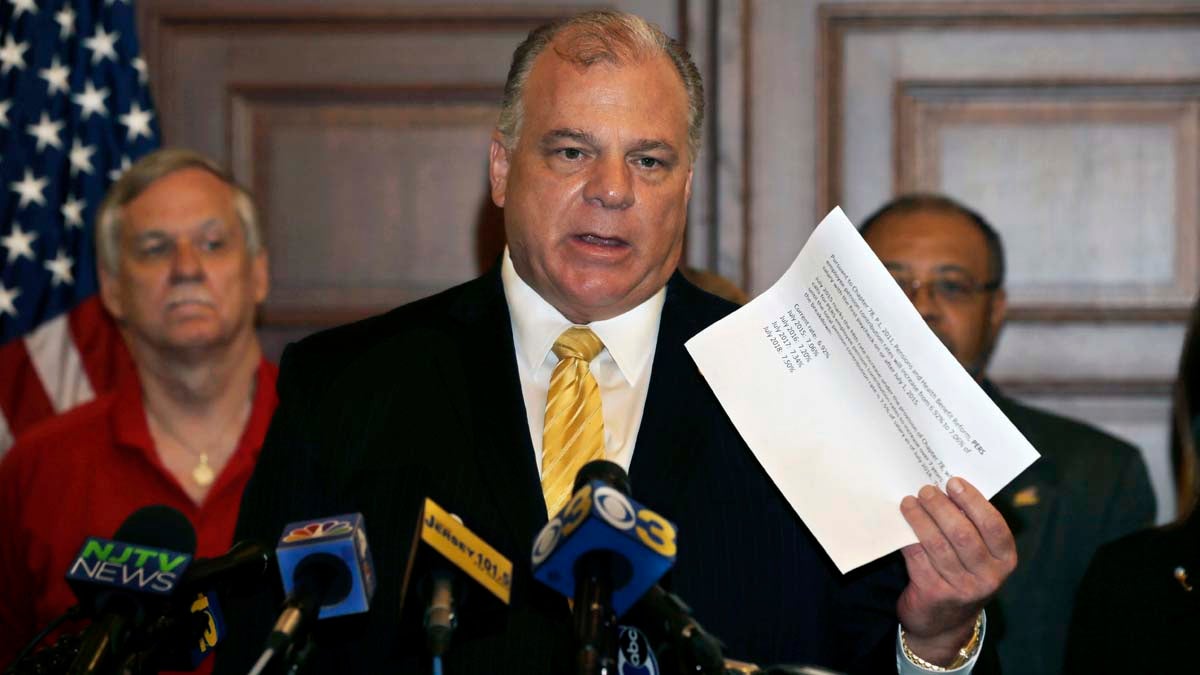NJ top court lets Christie off the hook on pensions, but Dems vow to keep fighting

New Jersey Senate President Steve Sweeney holds up a paper that shows planned increases in the amount that public workers must contribute to their pensions under a previous agreement with the Christie administration. Earlier Tuesday, the New Jersey Supreme Court sided with Gov. Chris Christie in a fight with public worker unions over pension funds. New Jersey's top court overturned a lower-court judge's order that told the Republican governor and the Democrat-controlled Legislature to work out a way to increase pension contributions for the current fiscal year. (AP Photo/Mel Evans)
Gov. Chris Christie called it a “victory for the taxpayers,” but labor leaders and Democratic legislators in New Jersey say the latest ruling from the state Supreme Court won’t stop them from fighting to roll back the governor’s proposed cuts to public pension payments.
The Garden State’s top court ruled Tuesday that Christie has no legal or constitutional obligation to honor the terms of a deal struck with legislators in 2011 that was meant to fully fund the state’s chronically neglected pension system.
Under that deal, public-sector workers agreed to pay more into the system on an individual basis, while the state agreed to spend billions to catch up on its own frequently postponed, but legally mandated payments.
That deal held until last year, when a new budget crisis led Christie to reduce the state’s payments once again. Labor groups challenged that decision, but Tuesday’s ruling found that the original deal does not amount to a “contract” that requires constitutional protection. Only a deal that was approved by New Jersey voters would enjoy that protection, the court said.
In a statement, the Christie administration hailed the ruling as “an important victory not only for our taxpayers who simply cannot afford these unsustainably high costs, but for limited, constitutional government.”
But in a press conference in Trenton Tuesday, labor and Democratic party leaders said Christie is simply putting today’s costs off onto tomorrow’s legislators, and they vowed to find a way to keep pensions fully funded.
“When we did pension reform [in 2011], it was nasty. And it was tough. But it was worthwhile,” said Steve Sweeney, president of the Democratically-controlled state Senate. “The governor and I, we had an understanding that pensions had to be funded. Because the problem doesn’t go away, it gets worse.
“Well, now you’re jeopardizing the retirement of 800,000 people that happen to be your neighbors. They pay taxes like everyone else,” Sweeney said.
Putting future lawmakers in ‘enormous hole’
Sweeney estimates that because of lost interest, a dollar withheld today could cost $3 to replace in the future. “They talk about binding future legislators — what do they think they’ve done with this?” Sweeney said. “They’ve put future legislators in an enormous hole.”
Sweeney says Democrats will try to pass a budget of their own that includes full pension payments. But to make their bill law, Democrats will probably need to override a Christie veto, something they’ve never managed before.
“We’ll going to pass a budget as we did last year that fully funds the pension payment. And he is going to choose, most likely, not to fund it. It’s just like with your kids — they say, ‘I can’t do it!’ There’s always a way, and a will … if you want.”
Sweeney says the Democratic plan will probably include a “millionaire’s tax,” a surcharge on the state’s wealthiest earners. But that would likely raise less than half of the $1.5 billion in payments that Christie proposes to withhold, and Democrats aren’t yet sure how to find the rest.
The governor, in his statement, urged Democrats to forget the old deal and start working on a new one. “The court’s position is clear, as is mine, it is time to move forward and work together to find a tangible, long-term solution,” the statement said. “In light of today’s decision, I urge all interested parties to come back to the table and partner with me to finally solve this problem once and for all.”
But Tuesday’s gathering of Democrats and labor leaders wasn’t exactly overflowing with bipartisan comity.
“The ruling is a travesty,” said Wendell Steinhauer, president of the New Jersey Education Association. “This is the old ‘kick the can down the road strategy’ … at the rate of funding they’re putting in, in 12 years, our pension system will be out of money. Tell me what they’re going to do in 12 years!”
Steinhauer said that while the prospect of overriding a Christie veto is daunting, shifting political winds may help the Democrats get the bipartisan support they need.
“The governor has never had a 34 percent approval rating before,” he said. “He’s done here in 2018. Governors come and governors go. But check the legislators’ terms — they’re here for decades.”
WHYY is your source for fact-based, in-depth journalism and information. As a nonprofit organization, we rely on financial support from readers like you. Please give today.




